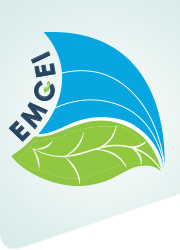 Authors who registered online have now their papers transferred to Springer for publication in the proceedings. Authors who did not register yet are kindly requested to register before September 12th. The online registration will remain open for participants without a paper only until September 30th.
Authors who registered online have now their papers transferred to Springer for publication in the proceedings. Authors who did not register yet are kindly requested to register before September 12th. The online registration will remain open for participants without a paper only until September 30th. 
AIMS & SCOPE

Currently, the Euro-Mediterranean region is facing not only significant political, economical, and social challenges,
but also an ever-growing environmental degradation that have made environmental and resource protection an increasingly
critical issue. These issues have re-energized the debate on the Euro-Mediterranean integration process through concrete
cooperative projects in many sectors, especially those concerned with environmental awareness, assessment, and improvement.
This integration process is intended to reduce the development gap between the northern and southern coasts of the Mediterranean
and to create new and closer political, economical, social, cultural, and, most importantly, scientific ties between these
two shores founded on common concerns.

In this context, and with the specific aim to promote Euro-Mediterranean scientific partnership so as to develop and integrate environmental research and findings into the activities of related sectors in the region, a group of Euro-Mediterranean scientists have recently launched the Euro-Mediterranean Journal for Environmental Integration. This Springer journal, which started in 2016, has been now indexed in the Web of Science (ISI’s ESCI database). It offers a scientific platform for presenting and discussing the latest advances in research with a focus on emerging environmental issues and challenges in the region. In particular, this first regional journal from the Euro-Mediterranean, encompassing all disciplines of the earth and environmental sciences, seeks to make societies and decision makers from related sectors aware of the importance of integrating environmental considerations into their respective activities. In this context, the journal provides a scientific forum that promotes the exchange of knowledge and fosters collaborations to improve the consistency of environmental management efforts between the countries of the northern and southern shores of the Mediterranean.

To further strengthen Euro-Mediterranean environmental integration, the Editors of the Euro-Mediterranean Journal for Environmental Integration organize this year, in close collaboration with Springer, the 2nd Euro-Mediterranean Conference for Environmental Integration (EMCEI-2). The conference aims to gather new research contributions from all disciplines of earth and environmental sciences by Euro-Mediterranean scientists from diverse backgrounds, and thus makes an essential contribution towards ensuring that science and knowledge contribute to the promotion of a more sustainable environment for the Euro-Mediterranean region.
CONFERENCE TRACKS
The scientific committee of the 2nd EMCEI invites research papers on all cross-cutting themes of the environmental sciences and engineering, with a main focus on the following 13 conference tracks:
- Track 1. Engineering applications for environmental management
- Track 2. Process control, simulations and intensification for environmental management
- Track 3. Ecotoxicology, environmental safety and bioremediation
- Track 4. Biotechnology for environmental management
- Track 5. Climate-change-related effects on the environment and ecological systems
- Track 6. Natural resources, agriculture and the environment
- Track 7. Smart technologies for environmentally friendly energy production
- Track 8. Remote sensing and GIS for environmental monitoring and management
- Track 9. Environmental impacts of natural hazards and environmental risk assessment
- Track 10. Sustainable management of marine and coastal environments
- Track 11. Sustainable management of the urban environment
- Track 12. Sustainable management of the indoor and built environment
- Track 13. Environmental-change-related impacts on human health
ABOUT EMCEI
PARTNERED JOURNALS & BOOK SERIES
-
 Euro-Mediterranean Journal for Environmental Integration (indexed in ISI's ESCI)
Euro-Mediterranean Journal for Environmental Integration (indexed in ISI's ESCI) -
 Environmental Science and Pollution Research (Impact Factor = 2.8)
Environmental Science and Pollution Research (Impact Factor = 2.8) -
 Arabian Journal of Geosciences
Arabian Journal of Geosciences
(Impact Factor = 0.8) -
 Regional Environmental Change
Regional Environmental Change
(Impact Factor = 2.8) -
 Environmental Monitoring and Assessment (Impact Factor = 1.8)
Environmental Monitoring and Assessment (Impact Factor = 1.8) -
 3 Biotech
3 Biotech
(Impact Factor = 1.4) -
 Applied Water Science (indexed in ISI's ESCI)
Applied Water Science (indexed in ISI's ESCI) -
 Nanotechnology for Environmental Engineering
Nanotechnology for Environmental Engineering -
 Earth Systems and Environment (indexed in Scopus)
Earth Systems and Environment (indexed in Scopus) -
 SN Applied Sciences
SN Applied Sciences -
 Advances in Science, Technology and Innovation
Advances in Science, Technology and Innovation










